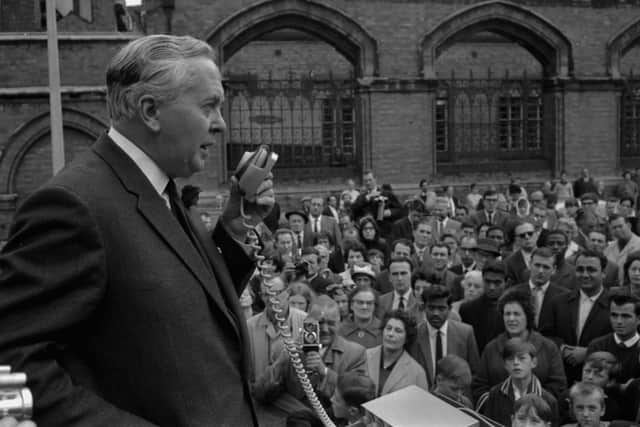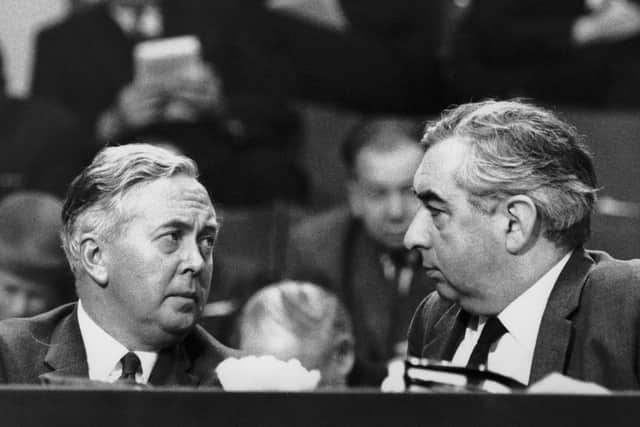Labour should heed lessons of the 1960s as landslide election win predicted: David Blunkett
Sixty years ago this spring, I joined the Labour Party in Shrewsbury, where I was at a school for blind youngsters, which has since moved to Hereford and become the post-16 Royal National College.
Back in 1964, the campaign was in full flight for the October general election, and the new leader of the Labour Party, Harold Wilson, and his deputy, George Brown, were touring the country on what used to be called the “stomp”.
Advertisement
Hide AdAdvertisement
Hide AdLarge public meetings, unheard of today, consisting not just of set speeches, but with the audience joining in as hecklers.


Skilled politicians were quick to provide a riposte.
Both Harold Wilson and George Brown were experts – in fact, they revelled in picking up the odd remark and throwing back a witty response.
The interesting thing about the rallies I attended as a newly signed-up member of the Party, was the way in which the local public school (Shrewsbury School) permitted their students out for the occasion.
Perhaps the head teacher thought that this would provide some ballast to the enthusiastic Labour supporters, or maybe to widen the horizons of his students.


Advertisement
Hide AdAdvertisement
Hide AdOne famous student at the school was Michael Heseltine, but I fear he’d already left for university by that time.
I, on the other hand, was starting the long journey of going to evening classes at the local Tech to begin my O-levels; then returning Sheffield to take up day-release classes and, again, evening school to study A-levels together with a National Certificate in Business Studies. Very different routes to the same outcome!
But what really struck me about my return to Shrewsbury was how much was unchanged. The world has clearly moved on, but many of the lessons to be learnt, and the fundamentals, have not.
All those years ago, the pundits were predicting a landslide win for Labour.
Advertisement
Hide AdAdvertisement
Hide AdHarold Macmillan had stood down after a torrid time in which he had sacked a third of his Cabinet, fallen out massively with his former Chancellor, Peter Thorneycroft, and had to deal with what became known as the Profumo Affair.
Jack Profumo, an otherwise decent man, had been caught up in a relationship with a young woman who was also in a “relationship" with a Soviet attaché.
What brought Profumo down was lying to the Prime Minister and the House of Commons, rather than the prurience of the time.
Alec Douglas Home, who took over, was a “toff". Harold Wilson, on the other hand, was good on television.
Advertisement
Hide AdAdvertisement
Hide AdHe talked about modernising Britain and a very different future; whilst his deputy, George Brown, related directly to the working class, albeit sometimes in a state of inebriation.
The Swinging 60s was underway (at least for some); the pill was liberating women, and the world of deference was slipping away, with David Frost and colleagues producing That Was The Week That Was for BBC television.
It was the first incursion into satire, and certainly a full-frontal, comic attack on the Establishment.
Yet, that October, Labour won by only four seats.
Yes, it was a win, but a very narrow one. Small “c” conservative England, and a resurgent Conservative Party in Scotland, had pulled back in the polling booth when faced with the choice of voting Labour or Conservative.
Advertisement
Hide AdAdvertisement
Hide AdAfter 13 years of considerable chaos in government and a clear choice between past and future, many still chose the past.
It is true that the Conservative Party were not tearing themselves apart as they are doing today.
I realised just how bad things must be for the current governing party when I started to read rumours that some people were promoting Priti Patel as their next leader.
Back then, however, there were figures who, at the very least, had gravitas and some moral underpinnings to their presence in the public arena.
Advertisement
Hide AdAdvertisement
Hide AdInventing a new set of honours for Easter would have left them looking up to the sky in bewilderment.
Whilst so much of the Swinging 60s passed me by, the lessons of the time did not.
As an avid listener of radio, and lots of time on my hands to walk in the glorious countryside, I started to forge my own beliefs based on a set of values about mutuality and reciprocity.
Then, and subsequently, success depended both on my own endeavours and willingness to have a go, but crucially, also on the support received from others.
Advertisement
Hide AdAdvertisement
Hide AdLittle did I know then, that years later, in the 1997 general election victory, I would find myself face-to-face with Michael Heseltine.
The pain of the enormity of the Conservative defeat became evident very quickly.
As I stuck my hand out to wish him well, the terse response was “bugger off”.
Well, we’re both still here – each of us, in our own way, still endeavouring to learn the lessons of the past, and to pass them on to future generations.
Advertisement
Hide AdAdvertisement
Hide AdThe cut and thrust of 1964 has morphed into the caution of 2024 but the challenges faced by an incoming government are as profound as ever, and the consequences of the outcomes are just as crucial as they were 60 years ago.
Comment Guidelines
National World encourages reader discussion on our stories. User feedback, insights and back-and-forth exchanges add a rich layer of context to reporting. Please review our Community Guidelines before commenting.